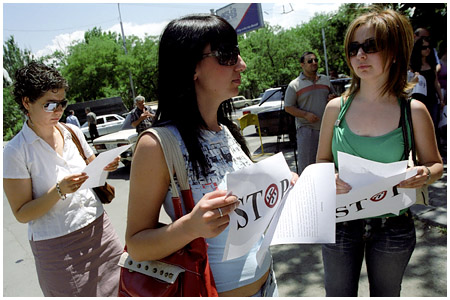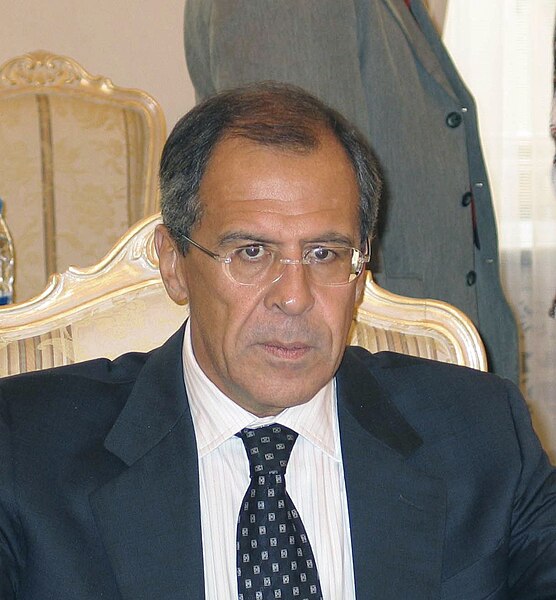Re: The Rise of the Russian Empire: Russo-Armenian Relations
Abkhazia in geopolitical game in the Caucasus

Fifteen years ago, on August 14, 1992, one of the worst ethnic conflicts in the Caucasus - between Georgia and Abkhazia - developed into a full-scale war, which lasted for 14 months. Its main results were: 8,000 dead on both sides; $11.3 billion worth of economic damage; a changed ethno-demographic situation in Abkhazia: the Georgians have become an ethnic minority (in different estimates, between 150,000-200,000 Georgians were displaced; Georgia puts the figure at 300,000); Abkhazia's ethno-demographic losses in 1992-1993 were comparable to the Muhajirism of the 1860-1870s.
It would be no exaggeration to say that today the unrecognized republic of Abkhazia is playing the biggest role in a major geopolitical game in the Caucasus. The Abkhazian issue is the main bone of contention between Russia and Georgia. Pro-Abkhazian sentiments of some part of the Russian military and political establishment are conducive to Georgia's pro-Western course, which is also influencing Russia's chief political ally in the Greater Caucasus - Armenia. De jure, Abkhazia is part of Georgia. De facto, Georgian sovereignty does not extend to the territory from the Psou River to the Inguri River. The Abkhazian leaders do not control only a small part of the republic in the upper reaches of the Kodori River. Until July 2006, Georgia did not control it, either. But now Tbilisi is trying to turn this hard-to-access area into a bridgehead.
Georgia's military defeat in 1993 was not limited to geopolitical losses (Georgia lost 12.5% of its territory and 200 km of the Black Sea coast). As distinct from South Ossetia, it led to the massive Georgian exodus from Abkhazia. In different estimates, about 200,000 Georgians left Abkhazia. The Abkhazian leaders were ready to discuss the refugees -- the most urgent problem for Georgia. They merely wanted to sort out those Georgians who fought against Abkhazia in 1992-1993. Abkhazia has repeatedly voiced apprehensions that the return of the Georgian refugees and a change in the ethno-demographic balance in their favor might result in a new ethnic purge, this time by Georgia. The Abkhazian leaders were particularly concerned over the return of the Georgian (Mengrel) refugees to the predominantly Georgian Galsky region - as of 1989, Georgians accounted for 93% of its population. They have repeatedly rejected the idea of the "broadest possible autonomy" under Georgian jurisdiction. Until 1992, Abkhazia had all attributes of autonomy de jure, and the Abkhazians consider return to the autonomous status no more than idle talk.
In its approach to both the South Ossetian and Abkhazian problems, the team of the incumbent Georgian president is trying to change the format of these inter-ethnic conflicts and turn them into a Russian-Georgian issue. The ultimate goal of this transformation is to internationalize the problem and deprive Russia of its status of an exclusive guarantor of ethno-political stability in Abkhazia. Mikheil Saakashvili named the United States, Ukraine and Turkey as potential co-sponsors of the peace process.
We believe that under the circumstances, the most rational decision is to delay all issues pertaining to the republic's status until the settlement of major humanitarian problems (education, medical treatment, conduct of business, free movement and contacts between Georgians and Abkhazians). Only after progress is achieved in their resolution, it will be possible to discuss Abkhazia's status. This plan may seem cynical but this is the only chance to avoid re-division of property and spheres of influence and escalation of inter-ethnic tensions in Abkhazia. Russia and the United States could guarantee the immunity of property and power in Abkhazia. Obviously, the Abkhazian elite, which have been propelled to their current position by the military victory in 1993, will be ready to discuss the republic's status with Georgia only after receiving guarantees of keeping the acquired resources and administrative rents. In this way Russia will ensure peace and stability in its southern frontiers.
Sergei Markedonov is head of the ethnic relations department at the Institute of Political and Military Analysis.
Source: http://en.rian.ru/analysis/20070813/71171789.html
Abkhazia in geopolitical game in the Caucasus
Fifteen years ago, on August 14, 1992, one of the worst ethnic conflicts in the Caucasus - between Georgia and Abkhazia - developed into a full-scale war, which lasted for 14 months. Its main results were: 8,000 dead on both sides; $11.3 billion worth of economic damage; a changed ethno-demographic situation in Abkhazia: the Georgians have become an ethnic minority (in different estimates, between 150,000-200,000 Georgians were displaced; Georgia puts the figure at 300,000); Abkhazia's ethno-demographic losses in 1992-1993 were comparable to the Muhajirism of the 1860-1870s.
It would be no exaggeration to say that today the unrecognized republic of Abkhazia is playing the biggest role in a major geopolitical game in the Caucasus. The Abkhazian issue is the main bone of contention between Russia and Georgia. Pro-Abkhazian sentiments of some part of the Russian military and political establishment are conducive to Georgia's pro-Western course, which is also influencing Russia's chief political ally in the Greater Caucasus - Armenia. De jure, Abkhazia is part of Georgia. De facto, Georgian sovereignty does not extend to the territory from the Psou River to the Inguri River. The Abkhazian leaders do not control only a small part of the republic in the upper reaches of the Kodori River. Until July 2006, Georgia did not control it, either. But now Tbilisi is trying to turn this hard-to-access area into a bridgehead.
Georgia's military defeat in 1993 was not limited to geopolitical losses (Georgia lost 12.5% of its territory and 200 km of the Black Sea coast). As distinct from South Ossetia, it led to the massive Georgian exodus from Abkhazia. In different estimates, about 200,000 Georgians left Abkhazia. The Abkhazian leaders were ready to discuss the refugees -- the most urgent problem for Georgia. They merely wanted to sort out those Georgians who fought against Abkhazia in 1992-1993. Abkhazia has repeatedly voiced apprehensions that the return of the Georgian refugees and a change in the ethno-demographic balance in their favor might result in a new ethnic purge, this time by Georgia. The Abkhazian leaders were particularly concerned over the return of the Georgian (Mengrel) refugees to the predominantly Georgian Galsky region - as of 1989, Georgians accounted for 93% of its population. They have repeatedly rejected the idea of the "broadest possible autonomy" under Georgian jurisdiction. Until 1992, Abkhazia had all attributes of autonomy de jure, and the Abkhazians consider return to the autonomous status no more than idle talk.
In its approach to both the South Ossetian and Abkhazian problems, the team of the incumbent Georgian president is trying to change the format of these inter-ethnic conflicts and turn them into a Russian-Georgian issue. The ultimate goal of this transformation is to internationalize the problem and deprive Russia of its status of an exclusive guarantor of ethno-political stability in Abkhazia. Mikheil Saakashvili named the United States, Ukraine and Turkey as potential co-sponsors of the peace process.
We believe that under the circumstances, the most rational decision is to delay all issues pertaining to the republic's status until the settlement of major humanitarian problems (education, medical treatment, conduct of business, free movement and contacts between Georgians and Abkhazians). Only after progress is achieved in their resolution, it will be possible to discuss Abkhazia's status. This plan may seem cynical but this is the only chance to avoid re-division of property and spheres of influence and escalation of inter-ethnic tensions in Abkhazia. Russia and the United States could guarantee the immunity of property and power in Abkhazia. Obviously, the Abkhazian elite, which have been propelled to their current position by the military victory in 1993, will be ready to discuss the republic's status with Georgia only after receiving guarantees of keeping the acquired resources and administrative rents. In this way Russia will ensure peace and stability in its southern frontiers.
Sergei Markedonov is head of the ethnic relations department at the Institute of Political and Military Analysis.
Source: http://en.rian.ru/analysis/20070813/71171789.html





















Comment